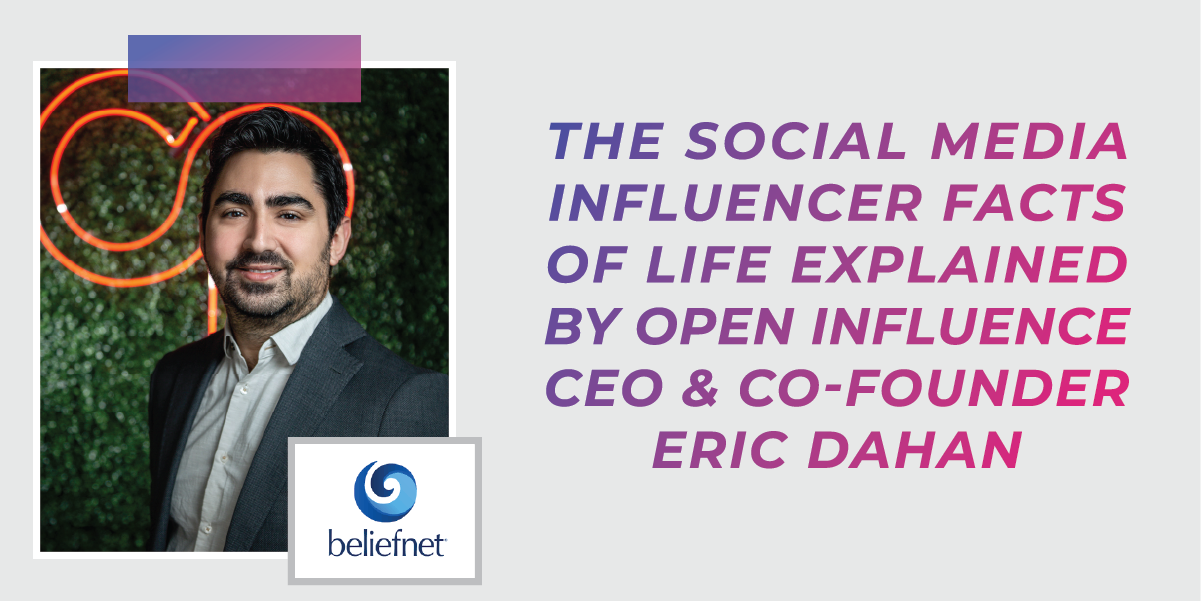Original Article: beliefnet
People of influence. According to the social media database Feedspot these are the “Top 125 Bible Instagram Influencers Most Followed in 2021.” Ryan Maher tops the list, beating out Joel Osteen (#2), Steven Furtick (#3), Tim Tebow (#4) and somebody with the Instagram handle Jesus the Lord (#5). It surprises me that some guy I don’t think I ever heard of tops the list but it really shouldn’t. I haven’t heard of many of the people who are considered red-hot social media influencers, no matter their category. In fact, the whole influencer phenomenon is a bit of a mystery to me – and, since I actually work in the media, when the opportunity to talk with a genuine expert in the field presented itself, I seized the opportunity.
Eric Dahan is the CEO and co-founder of Open Influence, a global influencer marketing firm with clients that include Disney, Google, and Amazon.
JWK: What does Open Influence do?
Eric Dahan: Think about us like a talent agency like WME or CAA or one of the large ones but, instead of representing the talent, we represent the advertiser. So, instead of just working with a handful of celebrities we work with over a million creators across social media – from your big-name celebrities all the way down to what we call micro influencers. What that looks like is we’ll send them brand deals. We’ll send them products. We’ll pay them to post about it and share it with their audience. We’ll work with all sorts of brands across different industries – from entertainment to consumer goods (including) automotive, beauty, apps and gaming, pretty much everything across the board.
JWK: Your clients include Disney, Google and Amazon, among the bigger companies. What do you do for them?
ED: We’ll just do their influencer marketing for them, depending on what the campaign is. So, if Disney has a new movie coming out – depending on what the movie is and who they’re looking to reach – to go launch it, we’ll partner up with the right influencers to share that message. You know, if it’s a Pixar movie we’ll gear that more towards families to launch it – as opposed to if it’s a Marvel movie. So, just depending on what that is we’ll pick different influencers and partner with different influencers. When we work with beauty brands, for example, we’ll send them a product. We’ll manage and have them post the product whether it be on Instagram or Facebook or what have you.
JWK: What defines an influencer? How does a person become one and how do you make a living at it? Do they come to you, do you go to them or how does this work?
ED: These are just people that have been creating on socials. They can talk about anything from the food they eat to the clothes they wear to how to fix an engine on a car to reviewing coffee machines. You have so many influencers out there on different platforms whether it be YouTube or Instragram or TikTok and they just grow an audience. For us, we don’t help them become influencers but we what we do is we engage with them once they are influencers and we help them monetize. So, we’ll be reaching out to them for brand deals. That’s the main way influencers earn money.
JWK: So, they reach a certain level of engagement with the public and then you seek them out and work out deals with them.
ED: That’s right – and they don’t need to be huge. There are a lot of them with like 10,000 followers or 20,000 followers. Those are like micro influencers. It could be someone in North Carolina who’s a mom who talks about parenting (to) 20,000 followers. She has a small audience but she really engages with that audience. So, we’ll reach out to her to do a brand deal. Obviously, we won’t be offering as much as we would to someone with 500,000 followers. It definitely scales depending on the influencer, the vertical that they’re in and the size (of the audience) of that influencer.
JWK: Before I spoke with you, I was doing a little web surfing and came upon a story about Polish influencer named Marta Rentel who is a TikTok star. She just did some kind of $250,000 deal. I mean most of these influencers are people I’ve never heard of. For the most part, unless you’re really into their specific subject, I would guess most people have no idea who many of these people are – but, I guess, they reach just the right target audience.
ED: That’s right – and that’s the thing. We live in a very decentralized world – and an information world. We all have our creators and content we watch. Not everyone’s watching the same shows on Netflix, right? My Netflix will look very different than a friend’s Netflix because we have a different universe of content that we watch – (including) different shows (reflecting) different things that we’re interested in. It’s the same thing with content on social and with influencers. So, in certain categories, an influencer might be completely unknown to someone who doesn’t understand that topic but to someone in that world they’re like a megastar.
JWK: Some of the major social media platforms include TikTok, YouTube and Twitch. I’m actually not familiar with that last one. Are they in competition with each other for content creators?
ED: Yeah. I mean…they all have their unique sort of features. YouTube is for longer-form video. So, if you’re going to create something (on) a topic that requires five to twenty minutes, typically, worth of content you’re going to go on YouTube (which is) really great for educational walkthroughs. It’s great for in-depth product reviews. It’s great for show recaps and all these different sort of things.
JWK: I know about YouTube and I’m sort of aware about what TikTok does. What the heck is Twitch? What does Twitch do?
ED: Twitch is live streaming. Even though live streaming could work with anything, what Twitch has built its community around is gamers because gamers will just stream themselves playing video games all day…and other people just watch them – which sounds kind of crazy…but it’s no different than watching people play sports. There are video game competitions and everything else. So, Twitch is a live-streaming platform where people will spend an hour or two hours just watching someone else play video games. Often times, in the background or on a second screen (they’ll be a product) or…they’ll hear the commentary from that person (about the product) while they’re playing.
JWK: So, this is like product placement. It’s not like you’re buying a thirty-second spot on their Twitch feed.
ED: Yeah, it’s just like talking about it organically. Twitch is a little nuanced too because what you have on Twitch is like you have your own page – like your channel’s page – and you can put links in there. So, what a lot Twitch streamers will do is they’ll sell ad spots on their page. They’ll say like “Give me five grand a month and I’ll put a link on the page.
JWK: According to The New York Times, Facebook will pour $1 billion into programs for creators of popular content through 2022. For the influencer, what does that mean?
ED: So, one, Facebook has been historically kind of less focused on influencers. They had this mentality of like creators (and) influencers are just users on the platform and, ultimately, if you want to advertise, you have to pay us for our ad network. I think they’ve really evolved that approach because you have a lot of competition from other apps fighting for creators and trying to attract creators. So, Facebook’s realized, if they want to stay relevant, they’re gonna need to keep great creators on the app and encourage new creators to build their audience on Facebook and (Facebook subsidiary) Instagram. So, they’ve released this fund to essentially pay creators. It’s similar to what Snapchat has done and what TikTok is doing with its creator fund. They’re looking at building out tools to help creators monetize revenue shares from ad dollars that come in. YouTube has that. They’re looking at doing the “tipping” feature…and they’re looking at doing premium-content sales. That’ll be like an influencer charging five dollars for people to subscribe to their content.
JWK: Isn’t almost everybody on Facebook a content creator? Shouldn’t they all be compensated? They’re giving the content to Facebook that Facebook is making money off of.
ED: That’s right – and now, essentially, Facebook is realizing it (and) they want to encourage that because if you’re a good creator and you’re creating often – and that’s what you’re doing full time – that content is so valuable to the users on the platform. If you’re not incentivizing people to put it on your platform, they’re going to go elsewhere – like the real creators…(Meanwhile) the (more passive) users are ultimately going to lose out on value if great creators are somewhere else because if great creators are somewhere else (and) you want to see fantastic content, you’re not going to get that from your average user.
JWK: What impact is Cancel Culture having on influencers? It seems like they can be pretty hot one day then something they posted five years ago pops up and that’s pretty much the end of the whole operation.
ED: 100%. It has a two-fold effect. One, it affects the influencers themselves because some influencers become radioactive. They’re not gonna get another brand deal. We’ve seen that happen several times. And then, on the brand side, brands are really diligent. They call it “brand safety” (which) is sort of the term that’s used for making sure that influencers are safe to work with and meet brand-safety requirements.
JWK: What would a “brand-safety requirement” be?
ED: A brand-safety requirement would be making sure that they’re not posting profanity or posting political speech, all the stuff that brands like to stay neutral on. For many brands being political doesn’t really help them.
JWK: So, they want to stay away from people who might tend to alienate a good part of their audience.
ED: People that have engaged in, again, profanity or someone who’s had a history of sexist behavior or racist behavior or anything like that. Those are the kind of things that get influencers rejected right away.
JWK: Does faith play any role in this? Do brands shy away from faith-related content creators? Are some attracted to that? How does faith play in the influencer world? Are faith influencers in this game at all in terms of attracting brands?
ED: Yes and no. I think it just kinda depends on the intensity of it. I think people showing their faith and gratitude and everything else is not really an issue.
JWK: I guess gratitude isn’t a controversial concept – but some sort of extreme religious position, be it right-wing or whatever, would naturally turn many potential brand partnerships away.
ED: That’s right. If it’s too extreme then it just doesn’t work and brands will shy away. If someone is pushing a hardcore extreme Christian message, we don’t want to associate with that but if someone’s like “We’re driving back from church” everyone’s fine with that.
JWK: Where do you see the influencer business – and your company – going? What’s the next big thing? It seems like there’s a new hot platform like every six months.
ED: I mean it’s evolving pretty quickly. We’re seeing more influencers pop up in more places as more social networks pop up. I also think that traditionally influencers would earn money and now we’re seeing that they have many more ways to earn directly from their audience – from direct subscriptions and everything else. So, there’s just a lot more opportunity coming into the space as it’s heating up.
Encourage one another and build each other up – 1 Thessalonians 5:11






